 Delamere Dairy is famous for its goats’ milk, butter and yogurt and award-winning goats’ cheeses, but the independently owned dairy company’s commitment to innovation doesn’t stop there. Alongside its market leading goats’ milk products, Delamere also supplies Channel Island cows’ milk and sterilised cows’ milk to retailers across the UK.
Delamere Dairy is famous for its goats’ milk, butter and yogurt and award-winning goats’ cheeses, but the independently owned dairy company’s commitment to innovation doesn’t stop there. Alongside its market leading goats’ milk products, Delamere also supplies Channel Island cows’ milk and sterilised cows’ milk to retailers across the UK.
Delamere Dairy’s founders Roger and Liz Sutton named their dairy after Cheshire’s beautiful Delamere Forest, where they started their first herd with just three goats! Almost 25 years later, nearly all major UK supermarkets stock a temptingly wide range of Delamere Dairy products and demand is so huge that family goat farmers across Britain are supplying milk. Ed Salt, Delamere Dairy’s Commercial Director, spoke to The Grocery Trader.
The Grocery Trader – To go back to the beginning, when was Delamere Dairy set up?
Roger and Liz founded Delamere Dairy in 1985 with three goats. The business has evolved from a purely farming enterprise to encompass all stages in the supply chain.
GT – Who’s in the management team? Who owns Delamere Dairy now?
The management team are Roger, Liz and myself, and the three of us own the business: our non-executive Chairman is Dick Steele, Chairman of Portmeirion Pottery.
GT – When did you become involved? What is your role?
I’ve been involved since the end of 2004. I was previously in the oil industry, running a lubricants business. I knew Roger and Liz and came in to help on sales and marketing. I look after the commercial side and general running of the business, and spend half my time dealing with customer-related issues.
GT – Oil to goats’ milk is quite a jump, isn’t it?
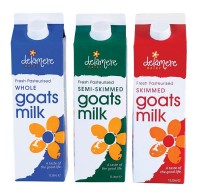 It’s not that big a jump. The product is sold in litres like oil, and it’s a competitive, cut throat sales environment, up against large companies.
It’s not that big a jump. The product is sold in litres like oil, and it’s a competitive, cut throat sales environment, up against large companies.
GT – When did your products first go into supermarkets?
We sold them to supermarkets from the outset. Roger and Liz bought a £25 grocery industry directory and started alphabetically with Asda, and the other major retailers followed.
GT – How supportive were the supermarkets, in the early days?
They have all been extremely supportive in the past. In 1986 goats’ milk was a very niche product and a bold move for them. These days all the major retailers are very keen on speciality milks, one compelling reason being that they command a higher price point and make more money.
GT – How big is Delamere Dairy in turnover and staff terms? How fast is it growing?
Our current turnover is £15m. We have 11 staff and have grown by around 25% per year for the last five years, a combination of goats’ milk’s fantastic growth in popularity and acquisitions in other areas.
GT – Do you export any of your products?
Exports are 4 to 5% of our business. We have an export customer base of Italian supermarkets, which we supply through our Italian distributor, and customers in Europe, the Middle East and the USA for goats’ butter and long life milk, who we supply through UK-based consolidators. There’s growing interest overseas in our cheeses and UHT milk.
GT – What proportion of your sales are goats’ milk, goats’ cheese and cows’ milk respectively? What share of the UK goats’ milk market do you have?
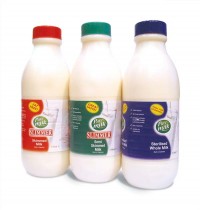 Goats’ milk and goats’ milk products are 60% of our products, of which 45% is liquid milk. We have 38% of the UK goats’ milk market. We supply 85% of the UK’s sterilised cows’ milk in plastic bottles.
Goats’ milk and goats’ milk products are 60% of our products, of which 45% is liquid milk. We have 38% of the UK goats’ milk market. We supply 85% of the UK’s sterilised cows’ milk in plastic bottles.
GT – What share of your turnover goes through multiple grocery outlets?
Some 85% of our turnover goes through multiples. We started out in multiple retail, and our distribution and other systems are geared to the retail market. We also go through wholesalers and cash ‘n’ carry chains.
GT – Do you do your own sales and distribution? Who handles your supply chain to the supermarkets?
We handle all our sales from here. We outsource our distribution to two companies, Peter Green (chilled) and Culina (ambient): we deliver to their central warehouses and they carry on from there.
GT – Where do you see goats’ milk fitting into the milk category in the multiples?
Personally I believe we’ve created a very clear market position: 10 years ago speciality milks were very limited; now they’re integrated with soya and other niche branded milks, and consumers understand there is a choice.
GT – Do you think goats’ milk should be merchandised with cows’ milk, or in a separate area, say with gluten-free and other free-from products?
We maintain all milks should be merchandised together. It’s the milk consumer you’re selling to, and you’re taking share from cows’ milk, not other speciality products.
GT – What proportion of total UK milk sales is goats’ milk? How fast is UK goats’ milk consumption growing? Why do you think this is?
Goats’ milk is 0.1% of total milk sales by volume, but its rate of sale and the value of sales make it an exciting market. Over the past five years goats’ milk overall has seen 15% annual volume growth. Last year was tricky for dairy generally, but we’ve continued to grow. The key driver is demand for fresh goats’ milk, which comes down to health awareness and/or people genuinely liking the taste. The UK traditionally consumes cows’ milk, but goats’ milk is the most widely drunk milk in the world.
GT – Looking at the UK market, who are the target consumers for goats’ milk?
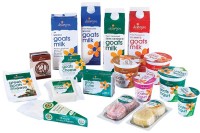 The largest user group is the over 50’s, followed by children with allergies. People buy goats’ milk products for two main reasons – health and taste. Three quarters of purchasers do so for health reasons, mainly allergies and intolerance. Goats’ milk offers other digestive benefits over cows’ milk.
The largest user group is the over 50’s, followed by children with allergies. People buy goats’ milk products for two main reasons – health and taste. Three quarters of purchasers do so for health reasons, mainly allergies and intolerance. Goats’ milk offers other digestive benefits over cows’ milk.
GT – How is goats’ milk beneficial to people with digestive problems?
The proteins and fats in goats’ milk create a softer curd, more closely matched nutritionally to human milk than cows’ milk and more digestible. It hasn’t been medically proven, simply because the formal research hasn’t been done, but the benefits are all logical and we have thousands of consumer case studies.
GT – How supportive are the big retailers these days to speciality food producers like you?
These days the big retailers are looking to stock more niche products, so if you can meet their requirements they are keen to work together.
GT – Is it any easier now to be a company like yours?
If anything it’s more challenging than five years ago – retailers want the best product at the best price. We offer premium products, but have to look at our costs like everyone else.
GT – How would you sum up the Delamere Dairy ethos – a business or a way of life?
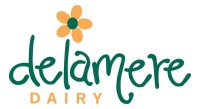 Delamere Dairy is still family-owned and like so many farming concerns it’s a way of life. Our heart and ethics are still much the same as they were originally, but dealing with the major retailers, we have to run as a commercial business.
Delamere Dairy is still family-owned and like so many farming concerns it’s a way of life. Our heart and ethics are still much the same as they were originally, but dealing with the major retailers, we have to run as a commercial business.
GT – What marks Delamere Dairy out as a dairy company?
We’ve always supplied branded milks, based on ethics and sustainability and working closely with the farmers we buy milk from. We’ve developed a market for our products and created standards which consumers now expect other milks to meet. Our branded products have Red Tractor Assured Food Standard approval for their welfare standards, and we have helped our retail customers achieve welfare approval for their own label products.
GT – How important is innovation to your business?
Innovation is one of our major assets. Being privately owned we have a short NPD decision line and can react quickly. We saw cats’ milks’ success in the pets’ treats sector and developed Top Life, a highly successful puppy, kitten, dog and cat milk brand, which is now in Tesco, Morrisons and Asda. Having links with all the retailers and delivering to them every day, we don’t need to set up new accounts and so on.
GT – How big is the opportunity for goats’ milk sales to pet owners? What are the health benefits of goats’ milk for pets?
Pets are currently 5% of our liquid milk business, and represent a major opportunity. Dogs and cats are all lactose intolerant: they love cows’ milk, but it upsets them.
GT – What proportion of your goats’ milk comes from other farms? What is your ‘specification’ for selecting these suppliers?
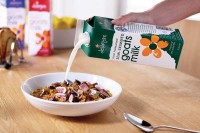 All our milk comes from a contracted farmer supply base. We’ve also outsourced our processing, tapping into modern technology and capacity. We can be choosy over our farmers – milking goats is not an easy option, it needs more labour and space than cows’ milk. We pick farmers who are passionate about moving into this area, have money to invest and are near our processing sites.
All our milk comes from a contracted farmer supply base. We’ve also outsourced our processing, tapping into modern technology and capacity. We can be choosy over our farmers – milking goats is not an easy option, it needs more labour and space than cows’ milk. We pick farmers who are passionate about moving into this area, have money to invest and are near our processing sites.
GT – Please talk us through your product range. Which of your products are ‘must-stocks’ for supermarkets, co-ops and convenience store chains?
Our fresh goats’ milks are whole, semi-skimmed and skimmed, and our UHT long life milks are whole and semi. Our goats’ cheeses range from soft and spreadable to hard. As we’ve grown we’ve outsourced our cheese technical team and work with co-packers: we’re a brand business with products made to our spec with our milk.
Our number one ‘must-stock‘ lines for the multiples are our fresh goats’ milk products, followed by our cheeses.
GT – You also market goats’ butter. Can you tell us about that?
Goats’ butter is a great product, which is growing fast. We sell it in 125g and 250g wraps. Goats’ milk contains no carotene and is pure white, so we add a bit of natural colour.
GT – What are your latest product launches? Any plans for any more?
Our latest launch is four-pack goats’ yogurts, the first in the UK, available in Ocado and Morrisons. We’ll be launching a honey goats’ cheese, which is sweet and malleable, later this year.
GT – What specific cows’ milk products do you supply? Which retailers do they go to?
We supply our Pure Milk sterilised milk to nearly all the major retailers and Channel Island milk, both own-label and branded to a smaller customer base.
GT – How did you get involved in cows’ milk products?
We made a strategic move to take a position in the Channel Island cows’ milk market after one of the multiples needed a solution to a problem with their product range and asked us to help. The sterilised milk business was acquired in 2005.
GT – How do English goats’ cheeses compare with French ones in quality and taste?
Soft goats’ cheese was introduced to the UK by the French. The British took goats’ milk and transposed it to their hard territorial style cheeses. There is now an abundance of fantastic British-made soft, hard and blue goats’ cheeses available in the UK.
GT – How long does goats’ milk keep for in the fridge at home compared to cows’ milk?
Goats’ milk is like cows’ milk, and should be consumed in three to five days once opened. The difference is our fresh products are packed with Extended Shelf Life Technology, giving 24 days’ life, eliminating the fear of wastage.
GT – Many children are very fussy about food and don’t like what they see as unusual tastes. Do you offer any products for children, to get them into goats’ milk and cheese?
Children can be very fussy, but they don’t notice the difference – the perception problem is with the adults!
GT – How important a part of your business is the ‘free from’ audience? Again, how do you promote yourselves to them?
Three out of four people we sell milk to fall into the ‘free from’ audience. We spend money in health publications and on health web sites. We have formed links with other organisations involved in health, and will explore this further.
GT – Do you exhibit your cheeses at cheese shows? What medals and awards have you won?
We exhibit at Nantwich International Cheese Show every year and support the British Cheese Awards and Festival. We sponsor the Goats Cheese Class at Nantwich and regularly win awards. We were the Reserve Supreme Champion in 2005, the Best Territorial Cheese in 2007, and in 2008 and 2009 we won Gold and Silver in various categories. The Nantwich Awards also have a general milk section, and this year we won gold, silver and bronze medals.
GT – What are your marketing and advertising plans for 2009/10?
We’re making a big push in the health and taste markets with health and cooking magazines and web sites. We’re looking to do more consumer exhibitions, pushing the taste benefits of goats’ milk and goats’ milk products.
GT – Looking ahead, what are the biggest external factors affecting your business?
The biggest factors are food allergy, obesity, the environment and traceability. Some 1 in 7 people are intolerant to cows’ milk, and the figure is growing, good news for goats’ products As a further advantage, goats’ milk is more digestible than cows’, so the fat is more completely processed.
Our milk processor won ‘Green Business of the Year’ in 2008. We always guarantee full product traceability.
GT – Finally, where do you see Delamere Dairy going from here?
We need to continue our growth. We aim to double the business within five years – with goats’ milk currently representing 0.1% of total UK milk volume sales, it’s certainly achievable. We’re a household name in lots of households, but we want to be a household name in all of them.
Delamere Dairy tel: 01565 632422 www.delameredairy.co.uk




1 Comment
Hi Do you produce a 1 pint steralised bottle,we are a small dairy selling around 200 pint per week and need a supplier.
Regards Neil Smith 01625 616178
Smiths dairies.